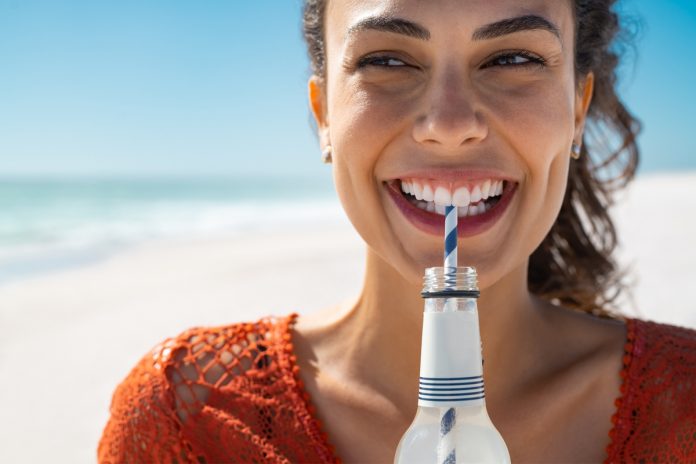Trendy drinks come and go all the time. Over the past few years, we’ve seen the sudden rise and fall of charcoal-infused drinks, vitamin beverages, and even colorful unicorn-themed lattes. Consumers constantly are searching for the next feel-good holy grail, and it seems that they have finally connected to something with significant staying power. CBD-infused products have experienced explosive growth in the last two years. Due to the recent legalization of hemp, the market now is flooded with topicals, tinctures, cosmetics and, most importantly, beverages.
CBD-infused beverages have impressively carved out their own product category and are well on the way to becoming a permanent fixture in the industry. Beverage makers across the country should keep a watchful eye on this lucrative revenue stream in 2020. According to Zenith Global, a world-leading food and drinks consultancy, the U.S. cannabis-infused drinks market will reach an estimated 1.4 billion by 2023.
That seems logical as 100 CBD beverages have already launched over the past year, selling teas, tonics, seltzers, and even water. The biggest brands are Vybes, Recess, and Sprig. The sudden demand for CBD-infused beverages is perfectly timed with the proliferation of the wellness industry which advocates for individual mental and physical self-care. CBD’s anti-inflammatory and relaxing properties align perfectly with the health-conscious consumer who is looking for a natural pick-me-up to help them start or end their day.
The rise in CBD’s popularity can also be attributed to celebrities who have embraced these changing consumer preferences. Willie Nelson recently launched his own CBD-infused whole bean coffee called “Willie’s Remedy.” Former NFL running back Terrell Davis is part of the trio who created Defy, a new CBD sports drink to help athletes recover faster between workouts and maintain a high level of focus for optimal performance.
This product boom is a win-win for beverage makers and consumers alike. For beverage makers, CBD-infused beverages will create an entirely new category. Sales won’t pull volume from other beverage categories like other drinks have in the past. When iced tea emerged as a popular category in the 90s, it was marketed as a healthier alternative to soda. But CBD beverages aren’t looking to replace any of the traditional beverages. Coke drinkers will still drink Coke for its distinctive flavor or the caffeine boost, but they may decide to calm work jitters in the middle of the day with a CBD tonic or unwind at the end of the night with CBD tea.
CBD doesn’t canna-balize revenues
As a health beverage, CBD will create a new, steady revenue stream for beverage makers. A new set of consumers can be expected to emerge with the market, too. There are scores of people who have heard about the benefits of CBD but may be too intimidated by the cost or unknowns of using tinctures or capsules. CBD beverages, on the other hand, are both cost-friendly and familiar to curious consumers, an ideal introductory product to the market.
While CBD beverages have been widely popular among a variety of age groups, they often are marketed to Gen X and Baby Boomer demographics. Many members of which have considerable disposable income and are drawn to the health benefits of CBD, including pain and anxiety relief. It’s not unusual for folks in this age range to pay $40–$50 on tinctures, signaling their willingness to embrace a more accessibly-priced product that may reap the same health benefits. At an average of $6 per drink, adding CBD drinks to the grocery list would be a no-brainer. The younger Millennial and Gen Z crowds will be quick to follow and also have demonstrated a steady demand for this feel-good product.
As it stands, traditional beverage companies have yet to capitalize on the opportunity presented by CBD-infused beverages because hemp regulations are still ambiguous. Big names like Coke, Pepsi, and Nestle are taking a wait-and-see approach, but analysts fully expect a rush in the market once CBD regulations are fully ironed out. This provides an ideal moment for independent regional brands to expand their market share and establish a loyal customer base before the onslaught.
The upside of CBD over THC beverages
While THC-infused beverages have experienced similar levels of enthusiasm, the market is still working out many regulatory obstacles which have hampered its overall growth. Though the market was expected to be worth $2 billion by 2021, the predictions have not been realized for several reasons. For one, the world of dispensaries is small—consider that the entire state of California has less than 600 dispensaries; New York only forty. It’s difficult to live up to such lofty expectations when only select stores in select regions sell the product.
CBD products do not face these kinds of regulatory or logistical hurdles. These beverages are widely available at supermarkets, juice bars, and even yoga studios. Although it seems like CBD beverages have completely saturated the market, this is only the beginning for the industry. CBD is a highly dynamic compound that has countless applications for a variety of needs and demographics. Beverage makers need to understand the robust market potential for CBD beverages and prepare for even more growth in 2020 and beyond.













